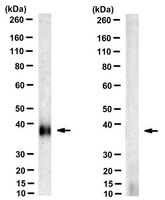MABS1994 Sigma-AldrichAnti-MT-ND4 Antibody, clone 9E4-2D8
Anti-MT-ND4, clone 9E4-2D8, Cat. No. MABS1994,is a mouse monoclonal antibody that detects NADH-ubiquinone oxidoreductase chain 4 and has been tested for use in Western Blotting.
More>> Anti-MT-ND4, clone 9E4-2D8, Cat. No. MABS1994,is a mouse monoclonal antibody that detects NADH-ubiquinone oxidoreductase chain 4 and has been tested for use in Western Blotting. Less<<Produits recommandés
Aperçu
| Replacement Information |
|---|
Tableau de caractéristiques principal
| Species Reactivity | Key Applications | Host | Format | Antibody Type |
|---|---|---|---|---|
| H | WB | M | Purified | Monoclonal Antibody |
| References |
|---|
| Product Information | |
|---|---|
| Format | Purified |
| Presentation | Purified mouse monoclonal antibody IgG2a in buffer containing HEPES-Buffered Saline (150 mM NaCl, 15 mM HEPES, pH 7.2) with 0.02% sodium azide. |
| Quality Level | MQ100 |
| Physicochemical Information |
|---|
| Dimensions |
|---|
| Materials Information |
|---|
| Toxicological Information |
|---|
| Safety Information according to GHS |
|---|
| Safety Information |
|---|
| Storage and Shipping Information | |
|---|---|
| Storage Conditions | Stable for 1 year at 2-8°C from date of receipt. |
| Packaging Information | |
|---|---|
| Material Size | 100 μg |
| Transport Information |
|---|
| Supplemental Information |
|---|
| Specifications |
|---|
| Global Trade Item Number | |
|---|---|
| Référence | GTIN |
| MABS1994 | 04054839355547 |
Documentation
Anti-MT-ND4 Antibody, clone 9E4-2D8 Certificats d'analyse
| Titre | Numéro de lot |
|---|---|
| Anti-MT-ND4, clone 9E4-2D8 - 4159005 | 4159005 |
| Anti-MT-ND4, clone 9E4-2D8 Monoclonal Antibody | Q2925828 |








